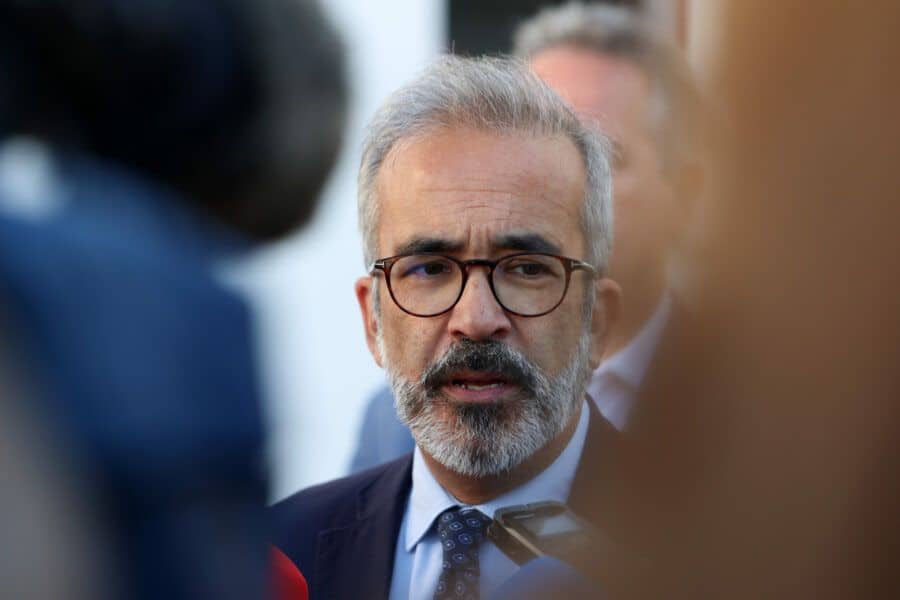Portugal bidding for non-permanent seat on Security Council
Portugal’s minister of foreign affairs, Paulo Rangel, has formally launched Portugal’s campaign for a non-permanent seat on the UN Security Council, under the slogan “Prevention, Partnership, Protection”.
At an event at a hotel in New York yesterday, in front of a room full of diplomats from all over the world, Rangel emphasised the advantages of Portugal’s candidacy, asking for support in the vote which will be taking place in 2026 and in which Portugal will be up against rival candidates and fellow European Union member states Germany and Austria.
According to the minister, Portugal will offer “preventive diplomacy” and the “building bridges” as well as a focus on “protection”.
“We have three main mottos for this campaign: on the one hand, the idea of preventing and avoiding conflicts,” Rangel told journalists before the event. “Therefore, being in the Security Council with what we call preventive diplomacy.
“Secondly, the building of bridges, being partners,” he went on. “We believe that, on an international level, and I would even say on a world level, the Portuguese state is known for its ability to build bridges on all continents – from Oceania to Asia, from Africa to the Americas or in Europe.
“Portugal has what is called ‘soft power’ (…) This is very relevant not only in security issues, but also in agendas such as the reform of international finance, so that the debt of the poorest countries, as in the case of Africa, can be restructured. And then we’ll also have the idea of protection.”
The election for membership of the Security Council – “one of the UN’s most important bodies”, according to Lusa, the mandate of which is to ensure the maintenance of international peace and security – takes place in 2026, for the 2027-2028 biennium.
Portugal’s direct opponents are Germany and Austria, in a race for the two non-permanent member seats allocated to the Western Europe and Other States group of countries.
The candidacy was formalised in January 2013. The elections for the 2027-2028 term are to take place during the 81st UN General Assembly in 2026, the year in which António Guterres – a former prime minister of Portugal – finishes his second five-year term as UN secretary-general.
Earlier this week, Portugal’s government announced it has earmarked €1.7 million for the Security Council membership bid.
Rangel expressed confidence that Portugal will be able to differentiate itself from Germany and Austria – two countries that, as he put it, “represent the same language, the same space” and have “very similar cultures.”
Portugal has a “more Atlantic vocation, a more maritime vocation” as well as “an important presence in the Americas and Africa, and a great tradition in Asia” – which are all “very important assets” in these circumstances, he believes.
“I am absolutely convinced that… if we run a campaign in line with the Portuguese tradition in the United Nations, we will be guaranteed election as a non-permanent member for the 2027/2028 biennium,” he said. “This is not overconfidence. As I say, we’ll have to work until the end… I think we have a lot of support in terms of quantity and quality.
“I think Portugal has a lot of chances”, he insisted, suggesting the ‘trump card’ is Portugal’s “capacity for dialogue with the whole world”.
As to future of relations between the UN and the new US administration under Donald Trump – who in his first term as US president cut funding to several UN agencies and withdrew from the United Nations Educational, Scientific and Cultural Organisation (UNESCO) – Rangel said he believes the organisation will be well prepared this time round.
“Of course, we know that President Trump’s doctrine in his first term was always to invest less in multilateral relations and more in bilateral relations, so this has had some consequences for UN funding,” he said. “But, so far as I know, the UN is also prepared to have some constraints at this level, so I honestly wouldn’t dramatise this issue either.”
Critics however would argue that the UN has deteriorated to such an extent that it is essentially ineffective these days – and the Security Council (with permanent members including Russia and China) underscoring this.
Source material: LUSA




















